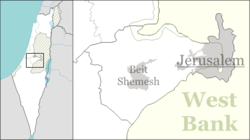Attack
The attack occurred at about 1:00 pm 14 April 2017, as a knife-wielding man stabbed a 21 year old British exchange student. An off-duty police officer riding the light rail pulled an emergency brake and tackled the perpetrator, who was then arrested. [4]
According to Israel's domestic security service, Shin Bet, the attacker was known to the authorities and the attack may have also involved a "suicide by soldier" motivation, [5] as attributed to other incidents in the last 18 months, [6] "This is yet another case of a Palestinian suffering from personal, mental or moral distress choosing to commit an act of terror to escape his problems." [7]
After his arrest, the perpetrator reportedly told investigators that he stabbed Bladon because he wanted the soldier standing beside her to kill him. [8] [9]
Suspect
The accused, Jamil Tamimi (57) a Palestinian Arab from the Ras al-Amud neighborhood of East Jerusalem who was known to security services; according to security services the accused was convicted of molesting his daughter in 2011. [14] [15] [7] [16] [17] [18] The accused had been admitted in the past to Kfar Shaul Mental Health Center, and a day before the attack he voluntarily admitted himself to a mental health treatment center in northern Israel from which he was expelled following a violent assault on a person. [5] [19] [20] On the morning of the attack he spoke to one of his sons who told him that the entire family wanted no contacted with him. He reportedly told investigators he had "nothing left to lose", and that he had purchased a knife in the Old City, before boarding a train close to Damascus Gate. [17] Following the attack, the accused was sent for a mental examination by a psychiatrist. [21] Psychiatric examiners judged him mentally fit to stand trial, [17] and he was subsequently charged with premeditated murder. [22] [14] [23]
Trial and sentencing
Tamimi confessed to having committed the murder, acknowledged his mental illness, apologized, and entered a plea-bargain under which he will serve 18 years in prison. [24] Hanna Bladon's family was "outraged" by the lenient sentence, arguing that the murderer ought to have been incarcerated for life. [25] In January 2019, the Jerusalem District Court formally sentenced him to 18 years in prison. [26]
On 26 January 2022, Tamimi was found dead in his cell at the Nitzan Prison. [27]
This page is based on this
Wikipedia article Text is available under the
CC BY-SA 4.0 license; additional terms may apply.
Images, videos and audio are available under their respective licenses.
